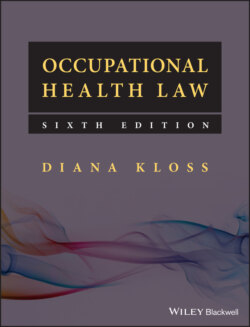Читать книгу Occupational Health Law - Diana Kloss - Страница 40
1.7 The inter‐disciplinary nature of occupational health
ОглавлениеThe law is on the whole very unspecific about demarcation between doctors and nurses. There are a number of detailed regulations about the supply and administration of medicines. Prescription‐only medicines (POMs) may only be supplied through a registered pharmacy on the written prescription of a doctor, dentist, or very exceptionally a specially registered nurse; and no person may administer medicines parenterally (administration by breach of the skin or mucous membrane) unless he is either a doctor or a dentist or acting in accordance with the directions of such a person. However, there are exceptions for OH nurses, now to be found in the Human Medicines Regulations 2012. These exempt from the above requirements the supply or administration of medicines in the course of an occupational health scheme by a registered nurse where the nurse is acting in accordance with the written general instructions of a doctor.
When a doctor signs a general instruction relating to the type of POM a nurse may supply (or in the case of injectables administer), it must be borne in mind that as the doctor is not prescribing for an individual patient, the nurse must exercise professional judgement and discretion when considering which product to administer or supply for the nature of the condition or combination of conditions from which the patient may be suffering.
(RCN: Occupational Health Nursing Services Handbook (1991))
Careful records must be kept and the nurse, who should be specifically named in the doctor’s authorisation, must never delegate her authority to a first‐aider or other nurse (Chapter 2).
The Human Medicines Regulations 2012 permit registered nurses employed in an occupational health service to be in possession of controlled drugs (like morphine) for the purpose of administration to persons injured or taken ill at the place of work at which the nurse is employed. The drugs must have been supplied to the nurse by a doctor employed at the place of work for the medical supervision of workers. Security must be efficient and the nurse must keep a register detailing every administration of the drugs. If the drugs are lost or stolen the nurse must report to the police as soon as possible.
Apart from the legislation about medicines, the division between the roles of doctor and nurse in any setting rests essentially on custom and practice. Both professions have something to say about the matter in their ethical rules. The Faculty of Occupational Medicine’s Good Occupational Medical Practice (Royal College of Physicians, 2017) states:
Occupational health services may be multi‐disciplinary. Other professionals may include occupational health nurses, physiotherapists, counsellors and safety advisors. In delegating within the team, occupational physicians are still responsible for the overall occupational medical care of the patient. You must only delegate professional tasks to those who are specifically trained and competent to perform the task in question.
The NMC, in its Code of Professional Conduct (2018), states that a nurse should acknowledge any limitations of competence and refuse to perform tasks outside those limitations.
Sometimes conflict arises with others in the workplace about the proper role and function of the OH nurse. Although a joint committee of the BMA and RCN advised that there should be a procedure for consultation between OH personnel to define their relative responsibilities, there can still be friction. The nurses in particular sometimes find themselves in conflict with safety officers. If the problem proves intractable, the best advice is for the nurse to contact EMAS at the local HSE offices. The Faculty of Occupational Medicine’s Ethics Guidance for Occupational Health Practice (2018) advises as follows:
Occupational health staff may work alongside safety professionals, occupational hygienists and others who do not have a clinical background. Sharing information with these non‐clinical colleagues can generate substantial health benefits and failure to do so may constitute a culpable act of omission. Nonetheless, care must be taken to appropriately safeguard clinical information when working with groups that do not have a professional duty of confidentiality.
Health professionals are themselves legally liable for any acts of negligence which cause damage. The OH doctor is only liable for the negligence of another member of the occupational health team if they were themselves negligent in asking the team member to do something without checking that they were competent. If they are employees acting in the course of employment, their employer is also vicariously liable for their negligence. It does not follow that, just because an employee is acting in an unauthorised way, they are exceeding the scope of their employment (Chapter 6).
